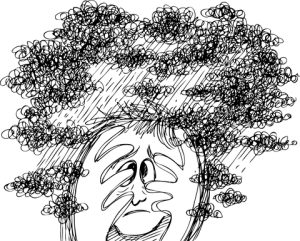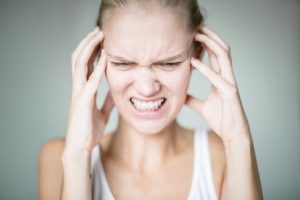
Throughout all my years living with MS, I never thought of this question as being related to this disorder. When I was younger, I just assumed it was the result of my chaotic life. As I got older, I attributed to just that—age. Not long ago, I read that noise and confusion may be bothersome to people with MS. But it’s not talked about very much, and I do read about MS actively in a number of sites.
Recently, my husband was grinding rock for hours in the backyard, and I thought I was going to flip out; the earplugs weren’t able to keep all the persistent noise out. Out of curiously, I went on the Reddit multiple sclerosis group and posted this:
“Does Too Much Confusion/Noise Bother You? These drives me nuts, especially if it’s loud and going on for a long time. I’ve been using earplugs a lot, or have to get away from it. I used to blame it on being an older age, but I’ve read that this is common in MS.”

Go to the right place to get a good answer.
Wow—83 upvotes so far and 49 comments. That was just less than a day ago, and the comments are still coming in. I wasn’t alone, as I read “Yes!” after “Yes!!” after “Yes!!!”.
While the comments were coming in, I wanted to know more. So, I googled ‘noise sensitivity and MS’. VeryWell Health states This condition, called hyperacusis, can be among the subtle effects of MS. This sound sensitivity can interfere with your ability to concentrate, socialize, or even sleep. Symptoms related to hyperacusis may wax and wane. Hyperacusis can result from damage to parts of the brain from MS…
Long ago, I had reached the stage that I don’t automatically assume all my quirky problems are caused by MS. Boy, was I wrong this time. My continued search led me to a 2018 post by Healthline about what triggers sensory overload: When surrounded by too much noise, exposed to too many visual stimuli, or put in new or loud environments, many people with MS report experiencing confusion, fatigue, and pain. Sometimes, sensory overload is related to myoclonus, a stimulus-sensitive symptom that can cause involuntary jerking of muscles.
What the Reddit group said.
There was much more feedback than I anticipated. Specific, useful comments were made after most of the ‘yesses’:
“I didn’t know this was MS potentially! I can’t focus and get really overwhelmed/irritable with lots of noise around me. Light too. I just think I’m a cranky adult baby.”
“Yes! While I drive — so hard to concentrate on everything with MS brain. And I’m not that old, yet. Just turned 49.”
“Yes. When I go to the grocery store… the lights, the noise, tons of signs everywhere. My brain gets tired easily with the more it has to interpret.”
“Your description is spot on for me too. I’m still trying to convince my neurologist that it’s an MS thing, they just said it’s tiring for everyone.”
“YES!!! I used to think it was me being cranky…but if I have more than one stimulus, like someone talking to me plus (any of the following: TV or music or one of my kids trying to talk to me or phone rings or anything else you can think of!)”
“Sure is a problem for me, and has been for a long time — at least since I was in my late 30s (I’m now 57). I carry earplugs with me at all times.”
“Yes loud, loud noises or lots of layers of noise I find so very uncomfortable. Sensory overload is common but not spoken about much!”
“Consider getting tested for audiological (and visual) processing disorder and chat with OT about a full cognitive assessment. If you are in the workforce, you may need workplace accommodation for your disability. For my spouse everything changed after reading the audiology report. It’s been really helpful for me to have the written results to explain my issue to loved ones.”
“Yes. I just got some noise cancelling headphones a month ago and they’re priceless. It made everything better and it made sure that my energy lasted longer.
“Recently, I’ve gotten really jumpy. Like for instance I’ll be on the computer at work and someone will walk into my section of offices and I like jump out of my skin. I don’t know why, but that’s been really bothering me lately.”
“I too thought it was just me!!”
“YES and YES! I had to give up driving. I also cannot sleep at night unless it is absolutely dark & quiet, so have to wear ear plugs & a night mask. I still have some insomnia nights where I am just too wired to sleep.”
“Yep. Some peoples’ sneezes feel like a grenade going off in my head. There’s a list of noises that cause me physical pain…
“Absolutely. I get incredibly frustrated and just want to jump out of my skin. I have asked to be moved to a different table in restaurants, I’ve left events or parties (sometimes I just need some time in a quiet spot, other times I just leave), I’m always asking my family to turn down the tv, etc. etc. I turn into a “rather not nice” if it is continuous with no escape.”
After reading the comments, I’m feeling ‘normal’.
Spreading the Word
Initially, I was beating myself up wondering, “Where have I been? Am I really that much out of touch?” But then I rationalized that VeryWell Health used the word “subtle”, and Healthline’s article also said that these things really aren’t talked about much. The specific, quick responses on the online Reddit group confirmed that this needs to brought out from under the rug.
What to do? Educate and communicate! It’s not all in our head, and there is a valid neurological explanation. Although we have to live with this and can’t prevent it, sharing information and solutions matter. I just put noise cancelling headphones on my shopping list.
If your doctors or others blow you off, show them this article. Being advised to reduce stress and fatigue may help, but it is easier said than done.
Debbie Petrina
Author of Managing MS
Community Advocate for MultipleSclerosis.net
www.DebbieMS.com
